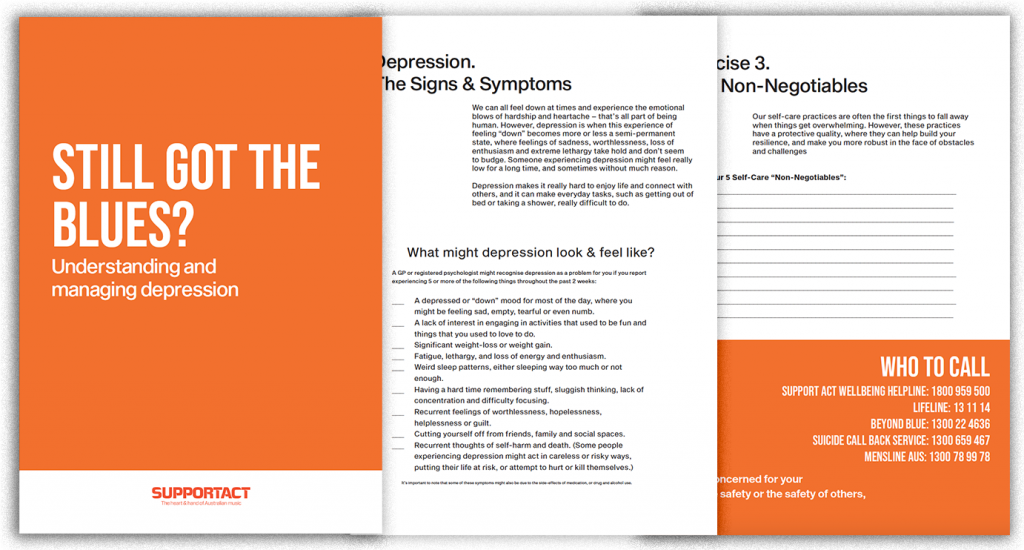Choose an Option
What is depression?
“I was in a bad place, no other way to put it. I just wasn’t thinking clearly… Not only did I not know the steps of getting treatment, I couldn’t even fathom wanting treatment or doing anything other than either rotting in bed or taking my own life.” Brendon Love [The Teskey Brothers]
We can all feel down at times and experience the emotional blows of hardship and heartache – that’s all part of being human. However, depression is when this experience of feeling “down” becomes more or less a semi-permanent state, where feelings of sadness, worthlessness, loss of enthusiasm and extreme lethargy take hold and don’t seem to budge. Someone experiencing depression might feel really low for a long time, and sometimes without much reason. Depression makes it really hard to enjoy life and connect with others, and it can make everyday tasks, such as getting out of bed or taking a shower, really difficult to complete.
Working in a volatile, unpredictable and high pressure industry like music can increase your risk of experiencing depression.

Depressed? you’re not alone.
According to our survey findings, over one-third of Aussie music industry workers reported having been diagnosed with depression in the past.
Signs and symptoms
A GP or registered psychologist might recognise depression as a problem for you if you report experiencing 5 or more of the following things throughout the past 2 weeks:
- A depressed or “down” mood for most of the day, where you might be feeling sad, empty, tearful or even numb.
- A lack of interest in engaging in activities that used to be fun and pleasurable
- Significant weight-loss or weight gain
- Fatigue, lethargy, and loss of energy and enthusiasm
- Weird sleep patterns, either sleeping way too much or not enough
- Having a hard time remembering stuff, sluggish thinking, and lack of concentration
- Recurrent feelings of worthlessness, hopelessness, helplessness or guilt
- Cutting yourself off from friends, family and social spaces
- Recurrent thoughts of self-harm and death. Some people experiencing depression might act in careless or risky ways, putting their life at risk or attempting to hurt or kill themselves.
It’s important to note that some of these symptoms might also be due to the side-effects of medication, or drug and alcohol use.
BRENDON LOVE [THE TESKEY BROTHERS] DIVES DEEP INTO HIS JOURNEY WITH DEPRESSION
Depression FAQs
Why do people get depressed?
Depression is also fairly common – approximately one in five adults in Australia will experience some form of depression at some time throughout their lives. It can be tough to go through, but understanding more about it is often the first step to recovery.
How do you deal with depression?
Depression requires a treatment approach that is tailored to the individual , and usually that means teaming up with a mental health practitioner for guidance and support. You don’t have to go it alone – in fact, it’s better if you don’t.
How can I support someone with depression?
Depression left untreated can have devastating consequences. In the worst cases, people with depression take their own life. If you are concerned about someone you think might be experiencing depression or is at risk of suicide – don’t wait. Reach out to them and support them using the following action plan:
CHECK IN: Find a quiet and private space to check-in and ask how they’re doing really. If you believe they’re at risk of suicide, ask them directly. To learn more about how to talk to someone about suicide, check out our free, online Suicide Prevention Training program
LISTEN: Ask open-questions and listen non-judgementally. People with depression often experience shame and guilt about having these thoughts and feelings.
GIVE: Give reassurance and information. Depression leaves people feeling hopeless and powerless. Remind the person that you’re there for them and want to do what you can to help them.
ENCOURAGE: Encourage the person to get professional support. The best place to start is booking an appointment with a GP or calling our Wellbeing Helpline on 1800 959 500.
GUIDE: Guide the person to learn more about depression, self-help and other support strategies (such as the resources below).
Articles about depression
CHECK OUT OUR DEPRESSION LIVE PANEL + ACTIVITY BOOKLET
Yarning Strong – NAIDOC Week special
Download your free depression activity booklet here:
Want more? give these a listen…
The yin and yang of the music industry with bliss (bliss n eso) | 28 min
Rhyme & Reason by MMAD (Musicians Making a Difference)
The Rhyme & Reason podcast features artists and musicians sharing their stories. This Episode follows Bliss from Bliss n Eso as he discusses mentally navigating the music industry and supporting mates through addiction.
Listen to Rhyme & Reason by MMAD here
Tim minchin #531 | 45 min
Mental Illness Happy Hour
With host Paul Gilmartinn, Mental Illness Happy Hour chats to different people about different issues each episode, exploring the many shades of grey of mental illness.
In this episode, Paul is joined by Tim Minchin as they talk about his debut studio album and what it’s like to live in the melancholy.
Listen to Mental Illness Happy Hour here
